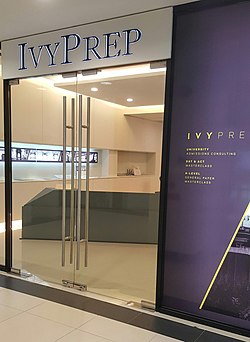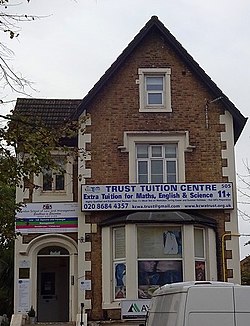Tuition centre


Tuition centres are a variety of cram schools in Asia, first originating in Singapore but also prevalent in Malaysia. They are private educational institutions which offer tutoring in various subjects and preparation for specific tests and examinations. In other Asian countries, they may have different names, such as hagwon in South Korea, buxiban in China or juku in Japan.
Background[]
The introduction and emergence of college and university entrance examinations led to the rise and growth of tuition centres.[citation needed]
Locations[]
Malaysia[]

According to the University of Malaya: "Private tutoring has become a commonly rooted practice in Malaysia. It is defined as a supplementary instruction outside the formal schooling system where a tutor teaches academic subjects for a fee. The Malaysian government is very particular with the usage of the term “tuition centres”. Licence for tuition centers are only given to institutions that provide tutoring on academic subjects based on the Malaysian curriculum. The tuition centers function by providing extra coaching to the students so that they are prepared for centralized examinations. Parents often view private tutoring as an avenue for enabling their children to excel in examinations".[1]
Singapore[]
The private tuition industry in Singapore is worth more than a billion dollars, with an estimated 1,000 tuition centres throughout the country.[2]
Tuition[]
Many school teachers (i.e. tutors) earn supplementary income through tuition centres and agencies by offering tutoring in a range of subjects (predominantly in English, Maths and the Sciences). Some teachers "advertise" their tuition classes and coach those who attend their classes on how to tackle examination questions (i.e. test prep). Their focus is primarily rote learning.[citation needed]
Because of fierce competition in academia for entrance into higher education, the aim of tutoring through tuition centres is not merely a passing result in the corresponding admissions assessments but the highest score possible - resulting in the focus of teaching shifting from transferring a deep and profound understanding in a given subject to drilling for exams.[3]
Tuition centres vs schools[]
In contrast to schools where teaching occurs in groups (i.e. classes) and set timetables, tuition centres offer students (i.e. tutees) mostly one-on-one instruction and at times convenient to both, the tutor and the tutee. While teachers at schools are paid through fixed yet capped monthly salaries, their counterparts at tuition centres are compensated through hourly rate payments with (theoretically) no boundaries.
There are teachers who earn up to RM10,000 or S$5,000 by giving private tuition. Notwithstanding, there is a huge, and still growing, trend among local parents who send their kids to tuition. Given the immense academic competition attributed to foreign scholars and the proliferating private-tuition trend, some parents feel that they have little choice but to engage tuition centres or opt for home tuition.[4][5][6][7]
See also[]
- College tuition
- Cram school
- Homeschooling
- In-home tutoring
- Tuition agency
References[]
- ^ Kenayathulla, Husaina Banu; Ubbudari, Magaswari (2017). Private Tutoring in Malaysia: The Nexus between Policy, People & Place. University of Malaya.
- ^ Kah Cheng, Kelvin Seah. "Tuition has ballooned to a S$1.4b industry in Singapore. Should we be concerned?". Today News.
- ^ "For many Hong Kong students, over-drilling for exams denies them the joy of learning". SCMP.
- ^ Teachers warned against doing business without approval Archived 21 May 2011 at the Wayback Machine
- ^ Do away with the tuition culture Archived 21 May 2011 at the Wayback Machine
- ^ Everybody else is earning extra income Archived 21 May 2011 at the Wayback Machine
- ^ Teachers reserving energy for tuition Archived 21 May 2011 at the Wayback Machine
- Test preparation companies
- School types